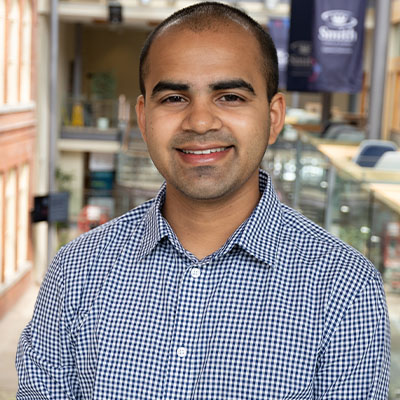
Bhargav Gopal
Assistant ProfessorOverview
I am an economist at the Smith School of Business, Queen's University, doing research at the intersection of labor, finance, and law and economics. I recently received a PhD from Columbia University. Prior to Columbia, I received a B.A. in Economics from UC Berkeley and was a Research Fellow at Stanford Law School.
Download Full CV Download Image
Appointment Type
Tenure/Tenure-Track
Academic Area
- Business Economics
Interest Topics
- Business Law
- Economics
- Governance
- Government & Policy
- Labour Economics
- Managing Diversity
- Women & Leadership
Faculty Details
Profile
Full Bio
I am a labor economist with interests in finance and law and economics. Using modern empirical methods and illustrative theoretical models, I strive to understand how governmental intervention in labor markets may improve societal outcomes. This agenda has been motivated by what initially appear to be market inefficiencies in several different labor market segments. In my job market paper, I document that all-male boards are the most popular form of corporate boards. This fact motivates the question of whether all-male boards maximize shareholder value, or whether other factors prevent qualified women from joining corporate leadership. In a completely different segment of the labor market – the market for fast food workers – several newspaper accounts have documented a prevalent usage of non-compete agreements. These agreements prevent workers from joining competing firms, and employers claim that they incentivize firms to invest in the general human capital of the workforce. In contrast, opponents cite that employers with market power may coerce workers into signing non-compete agreements – locking workers into their positions without conferring any benefits in return.Against this backdrop, my research explores the efficacy of governmental intervention in addressing potential inefficiencies in the labor market. My job market paper finds that firms quickly complied with requirements mandating at least one female board member, and that the intervention did not harm financial outcomes. The regulation increased gender-equity without reducing measures of financial performance, and so these results question why all-male boards were prevalent prior to the intervention. I find that limited female employment connections to corporate leadership is a plausible explanation, which contributes to literature within labor economics on the determinants of the ‘Glass Ceiling.’ This research generates some follow up questions which I am currently investigating. Can more modest pressures to increase corporate board gender diversity (such as mandatory gender disclosure requirements imposed by the NASDAQ listing exchange) succeed in placing women onto corporate boards? And do firms subject to the gender quota continue to recruit women onto their boards, even absent policy pressures to diversify?
In a parallel strand of work, I study how governmental intervention – in the form of increased state-level enforcement of non-compete agreements – affects worker-level outcomes. Using 18 changes in the state-level enforcement of non-compete agreements between 1992 to 2014 and individual-level data from the Current Population Survey, I find that a one standard-deviation increase in non-compete enforcement raises wages by 3 to 7 percent and has minimal effects on job mobility, unemployment, or labor force participation decisions. Increased wages suggests that strict non-compete regulation may serve socially efficient purposes, but a limitation of the study (and the literature at large) is its inability to shed insight into how non-compete agreements themselves affect a representative sample of workers. In ongoing work, I use newly released panel data from the National Longitudinal Survey of Youth to find that non-compete signers have longer job tenures, receive more employer provided training, but do not experience higher wage growth. Non-compete agreements are substantially more likely to be used in industries such as professional services, where knowledge is easily transferrable. These descriptive results suggest blanket bans on non-compete agreements are not socially efficient and are rationalized through a contract theory model that builds upon Hashimoto (1981). The model shows how non-compete agreements can create one market failure – inefficient lack of job separation – while mitigating a separate market failure – inefficient provision of industry-specific training by firms.
My research has been visible in and supported by the academic community. I have received 8 grants and fellowships and have recruited over 15 undergraduate and masters-level research assistants. I have disseminated my research broadly within and outside Columbia University. I have presented my research 10 times within Columbia at various seminars and have delivered 3 conference presentations.
Academic Degrees
PhD Economics, Columbia University, (2023)
B.A Economics, University of California, Berkeley (2015)
Publications
Working Papers
Training and Job Separation in Imperfect Labor Markets: The Case of Non-Compete Agreements (with Xiangru Li)
The Effects of Non-Compete Regulation
Job Market Paper
How Do Firms Respond to Gender Quotas? Evidence from California’s Senate Bill 826
Teaching
Teaching Experience
- Economics of Race in the United States – TA (Fall 2018)
- Economics of New York City – TA (Spring 2019)
Research
Research Experience
Research Assistant for Sandra Black at Columbia University (2019 - 2021)
Research Assistant for John Donohue at Stanford Law School (2015 – 2017)
Presentations
Conference Presentations
Interdisciplinary Graduate Student Seminar Series at Columbia University (2022) - Recipient of $500 honorarium.
Discrimination and Disparities Workshop at University of East Anglia (2022)
Annual Economics Graduate Student Conference of Washington University in St. Louis (2022)
Awards
Honors, Fellowships and Awards
- Dean's Fellowship, Department of Economics, Columbia University (2017-2021)
- Dissertation Fellowship, Department of Economics, Columbia University (2022)
- Program for Economic Research Grant (2022)
- Microeconomic Theory Initiative Matching Grant (2022)
- Applied Microeconomics Colloquium Grant (2020,2021,2022)
- Graduate School of Arts and Sciences Grant (2022)
Service
Service
- Arts and Sciences Graduate Council at Columbia University (2019 – 2021)
- Recipient of Honorary Own Award for Leadership and Service (2021)